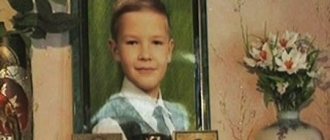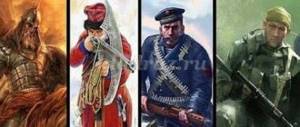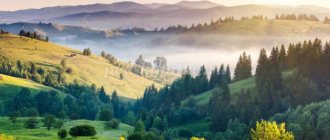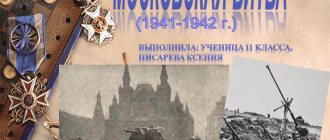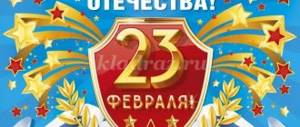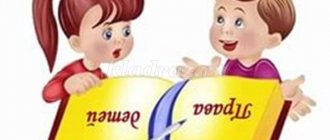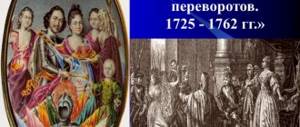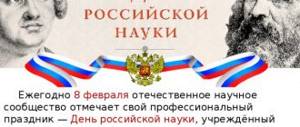Evening dedicated to the Day of Heroes of the Fatherland for students in grades 8-11 with a presentation
Evening dedicated to the Day of Heroes of the Fatherland Scenario “...And courage was carried like a banner”
Goal: education of patriotism, citizenship, a sense of duty and respect for the historical past of Russia. Objectives: 1. tell students about fellow villagers who participated in the Second World War and local conflicts in Afghanistan and Chechnya; 2. develop interest in the historical past of our country; 3. to instill in students a sense of patriotism and civic duty, respect for the memory of the defenders of the Fatherland; 4. instill in students an interest in culture, develop expressive reading skills Form: theme evening Age: students in grades 8-11 Invited to the event: WWII participant Lubyankin A.N., representatives of the Veterans Council N.I. Yurakova and Bogdanovich N.I., Father Andrey, head of the group, lieutenant colonel of military unit 25625 Morozov A.I. Design: excerpts of poems and sayings are written on the stage. There is an exhibition of photographs and books against the wall. Equipment: computer, multimedia projector NO, courage does not happen by chance. It was born in the soul of a soldier. When he doesn’t forget about his friends and doesn’t think of himself apart from his homeland! Andrey Dementyev (1 slide)
Presenter 1:
Good afternoon, dear guests, dear teachers and students!
Today our country celebrates the Day of Heroes of the Fatherland. This memorial date was established in 2007. Presenter 2:
December 9 was not chosen by chance.
Until 1917, it was dedicated to honoring the merits of the Knights of St. George. Currently, the country honors Heroes of the Soviet Union, Knights of the Order of St. George and the Order of Glory, Heroes of Socialist Labor, Heroes of the Russian Federation. Presenter 1:
We would all like to live in a world completely free from war and violence.
One can think a lot about this blessed dream, common to almost all of humanity. But, unfortunately, there are many military dangers in the world, and therefore, along with peaceful workers, our country needs warriors to defend our native Fatherland. Presenter 2:
At all times, all peoples defended their country, therefore we must be patriots of our Motherland.
The warrior lives in each of us. Next to their fathers, grandfathers and older brothers, matured children grow into adults, become soldiers, defenders of the Fatherland. Presenter 1:
Russia has always been famous for its brave heroes, More than once it was alarmed by the crazy dawns of war, Both officer and private were raised on valor.
And for the Fatherland he was eager to fight according to honor and conscience! Presenter 2:
There are events in the history of our great Motherland, the meaning of which does not fade from the inexorable passage of time; they are preserved by the people's memory.
After all, memory is a sacred link between the past and the future. It is difficult to find a state on the planet that has had to fight as much as Russia. Defending the homeland is a sacred duty for every person living in it. Readers: 1 student:
Russia!
Don't look for another word. There is no other fate in the world. You are all a continuous field of Kulikovo For many years. Student 2:
Russia!
This word was born in the sound of awakened swords, in the canvases of blue-eyed Rublev and in the silence of pre-storm nights. 3rd student:
The dew ripened on the battlefield, Axes sang on the ashes.
We forgave everything. We - Great Russians - are always generous and kind. 4 student:
Russia!
This word sounded, Inscribing our names in immortality From the ice of the Neva - To the field of Kulikov, From Kulikov - To Borodin! 5 student:
They wanted to make you lifeless, Take away your sadness and mischief, You endured Genghis Khan and his faithful successors for so many years.
1 part.
Great Patriotic War Presenter 1:
In 1941, everyone stood up as one to defend the Fatherland.
Loyal to their people, the Motherland, the soldiers of our army and navy, in their first battles with the enemy, showed high examples of heroism, cohesion, perseverance and mutual assistance. Presenter 2:
There is a monument in our village that is dear to our hearts. It was erected in memory of fellow villagers who died during the Great Patriotic War of 1941-1945. On the memorial plaque we read: “Eternal glory to the heroes and fellow villagers who fell during the Great Patriotic War.” “You lived valiantly, crushed death, the memory of you will never die!” - this is about our fellow villagers. (2 slide)
Presenter 1:
At the first call of the Motherland, our fellow villagers go to the front to defend the greatness of the Motherland with their breasts. Among the first to go to the front were Plotnikov Yakov Gerasimovich, Evtin Mikhail Nikolaevich, Fursov Andrey Semenovich, Sychev Vasily Kondratievich, Sychev Nikolai Kondratievich, Sychev Fedor Kondratievich, Serebryannikov Pavel Trofimovich. (3 slide) Sychev Vasily Kondratievich
Sychev Fedor Kondratievich
Sychev Nikolai Kondratievich
Presenter 2:
School director in 1941-1943.
was Enin Mikhail Iosifovich. The school archive contains a book of orders, which contains a record of his dismissal due to conscription into the active army. He died in 1944. Presenter 1:
Andrey Fedorovich Smirnov and Mikhail Makarovich Nabatov laid down their lives near Moscow.
Frolov Ivan Aleksandrovich died at Stalingrad. (4 slide) Presenter 2:
Nikolai Kirillovich Grebenyuk managed to send home from the front only one letter, in which he said: “We are going to liberate Staraya Russa.” (5 slide)
Grebenyuk Nikolai Kirillovich For three years, Prokofy Trofimovich Chepurny was spared by the enemy’s bullet; he would die in 1944.
in East Prussia. Presenter 1:
In one year, seven Efremov brothers went to the front: Ivan, Protas, Egor, Dmitry, Stepan, Pavel, Valentin.
Four of them laid down their lives for the fatherland. Presenter 2:
Marina Kuzminichna Serebrennikova escorted her husband, son and son-in-law to the front.
The combat path of her husband Pavel Trofimovich was the battle of Moscow, the Battle of Stalingrad, the Kursk Arc of Fire. An enemy bullet overtook him near the walls of Belgrade. Marina Kuzminichna’s son-in-law also died after being seriously wounded. The son was seriously injured. Presenter 1:
Tatura’s brothers died for their homeland: Alexander, Nikolai and Philip.
On the memorial plaque of our obelisk there are also surnames: Dmitry Naumovich Sivodin, Grigory Naumovich Sivodin and Mikhail Naumovich Sivodin. All three are brothers, they also died in battles for their homeland. The song “Cranes” is playing. Presenter 2:
Letters from the front recreate for us the pages of the heroic past, which has already become history.
In them we see an extraordinary wealth of feelings and thoughts. Characters and personalities were forged in the war. Reader:
There is a metallic sound in my voice.
I entered life hard and straight. Not everyone will die. Not everything will be included in the catalogue. But just let a Descendant, under my name, discern in the archival rubbish a Piece of hot land faithful to us, Where we walked with charred mouths And carried courage like a banner.. <…> Nikolai Mayorov Presenter 1:
Misfortune looked twice into the house of Tatyana Ivanovna’s Oil .
The first sad news about the death of her husband Mikhail Nikolaevich near Vinnitsa came in 1943. The second came on Victory Day. A friend of his son, Mikhail Khaluev, wrote: “Don’t be upset, don’t be killed. Your son Nikolai died a hero. He had four government awards, and we, the guardsmen of unit 41457-E, where your son Nikolai served, will take revenge on the enemy for the death of our friend.” Presenter 2:
Sofya Andreevna Eremina kept the forty-seven Red Army corners of her husband all her life.
Here are the meager lines of these letters: “When will the war end?.. But still, victory will be ours... Sonya, you probably read about our victories near Moscow? My tiny piece is in them... Sonya, don’t spare anything for defense purposes, every penny of ours will go towards the quickest defeat of fascism.” (6 slide)
Eremin P.A.
Presenter 1:
Some of our fellow villagers celebrated the Victory in Berlin. Among them was Vnukov Fedor Mikhailovich, who received gratitude from Zhukov himself. A unique document has been preserved in the school archives. It was presented to our fellow villager 60 years ago. “To comrade Vnukov F.M. By decision of the XII Session of the Supreme Council of the USSR, you are demobilized from the Active Army and returned to your homeland. You have come a long and difficult way along the roads of war. Many severe trials have befallen you. But the difficulties and hardships that had to be endured in battles and campaigns were not in vain. Under the leadership of the great STALIN, an unprecedented victory in history was won over the most powerful and insidious enemy—Hitler Germany. The Red Army not only defended the honor and independence of our Motherland, but also returned freedom to the enslaved peoples of Europe. We had the great honor of finishing off the enemy in the center of his beastly lair and hoisting the Victory Banner over Berlin. FOR YOUR HONORABLE SERVICE FOR THE GOOD OF OUR MOTHERLAND, I DECLARE TO YOU. Commander-in-Chief Member of the Military Council of the Soviet Occupation Lieutenant General Troops in Germany TELEGIN Marshal of the Soviet Union G. ZHUKOV October 1, 1945.” (7 slide)
Presenter 2:
Many of our fellow countrymen died at the front. But there were also those who returned home to their relatives, awarded high awards for their heroism in front of their homeland. Alexey Nikolaevich Lubyankin took part in combat operations on the war fronts from December 1941 to August 1944. He was a scout and for his exploits was awarded the Order of Glory, III degree, and the Order of the Patriotic War, II degree. (8 slide)
Speech by Lubyankin A.N.
Presenter 1:
Ivan Stepanovich Rubtsov fought in August 1945 on the 2nd Far Eastern Front in the 368th separate mountain rifle regiment.
He was a machine gunner. He was awarded the Order of the Patriotic War, II degree. Presenter 2:
Makar Afanasyevich Mazurok also took part in the fighting against the Japanese army on the Far Eastern Front.
He was a reconnaissance telephone operator and was awarded the Order of the Patriotic War, II degree. Presenter 1:
Pyotr Danilovich Kolodin - participant in the war with Japan in August 1945, awarded the Order of the Patriotic War and the medal “For the victory over Germany in the Great Patriotic War of 1941-1945.”
Presenter 2:
Ivan Markovich Tarasenko fought from October 1941 to April 1945 on the North-Western and 2nd Baltic Fronts.
He has the Order of the Patriotic War and two medals: “For Military Merit” and “For the Capture of Koenigsberg.” Presenter 1:
Sergei Dorofeevich Loginov has participated in hostilities since 1941.
to 1945. He was awarded the Order of the Patriotic War and three medals: “For courage”, “For the defense of Leningrad” and “For victory over Japan”. Presenter 2:
Shchedrakov Yakov Ivanovich - participant in the defeat of imperialist Japan in 1945.
Signalman. Awarded the medals “For Victory over Japan” and “For Victory over Germany.” He worked at school as a physical education teacher. (9 slide) Shchedrakov Yakov Ivanovich The names of Heroes entered the heroic history of our country and are forever inscribed in the Book of Memory. Reader:
In a harsh year, we ourselves have become stricter, Like a dark forest, silent from the rain, And, oddly enough, it seems younger, Having lost everything and found it again.
Among the grey-eyed, strong-shouldered, dexterous, With a soul like the Volga in high water, We became friends with the chatter of a rifle, Remembering the order of our dear Motherland. The girls did not see us off with a song, But with a long look, dry from melancholy, Our wives pressed us tightly to their hearts, And we promised them: we will defend! Yes, let us defend our native birches, the gardens and songs of our grandfather’s country, so that this snow, which has absorbed blood and tears, burns in the rays of an unprecedented spring. No matter how much rest the soul desires, No matter how thirsty the hearts languish, We will bring our harsh, manly work - and with honor - to the end! The verse was written: 1941, part 2. Local conflict on the territory of Afghanistan Presenter 2:
The Great Patriotic War is over.
Years have passed. But our soldiers still fulfill their civic duty. Speech by the head of the group, lieutenant colonel of military unit 25625 A.N. Morozov. Presenter 1:
Our Russian army always followed orders.
The order is not discussed. So the order was given to our army to send troops to Afghanistan on December 25, 1979. (10 slide) Presenter 1:
Our fellow villager Vyacheslav Vladimirovich Vozhannikov took part in this war.
Vyacheslav Vladimirovich studied at our school. After graduating from college, he was drafted into the Soviet Army in 1986 and fought in Afghanistan. He was deputy commander of an automobile platoon. Has awards. But he doesn't like to remember this time. Presenter 2:
Viktor Kazimirovich Nesterenko graduated from the Korf school, then the Khabarovsk river school, and went to serve in the border troops.
In the summer of 1986, he was sent to a hot spot in Afghanistan, where he served for 1.5 years. In 1987, Viktor Kazimirovich returned with awards. Presenter 1:
According to official data, in this undeclared war, about 14 thousand Soviet soldiers died, 35 thousand were wounded, more than 300 were missing or captured
Presenter 2:
It was not soldiers or officers who started this war, but it was they had to pay.
To pay with the most precious thing a person has - life. Presenter 1:
Happy memory to all those who did not return from the war.
Who became a piece of silence From an undeclared war. Performance of the song “Afghanistan” by students of 8th and 11th grades.
Part 3.
Local conflict on the territory of Chechnya Presenter 1:
Chechnya is a sore wound for all of us.
In war, everyone has their own path. War is a severe disaster for the very essence of the human personality. A test that is hard to even imagine. Now, thank God, the Chechens are returning to a peaceful life, but the price for peace is too sad - human lives. Human losses on both sides (military, civilians, militants) amounted to 12.7 thousand people killed, about 15 thousand injured. More than 60 are missing. More than 60 thousand residential buildings and administrative buildings, 20 km of railways were completely or partially destroyed. The young guys are worthy of the feat of their grandfathers. The fate of one of them is an example of loyalty to the country and the sanctity of duty. Our generation has picked up the great baton of loyalty, courage and heroism. Presenter 2:
The “Black Tulip” monument erected in their honor on Glory Square in Khabarovsk became a symbol of grief. A memorial plaque was unveiled at the school in memory of graduate Evtin Denis Aleksandrovich, who died in Chechnya. His feat is also described in the “Book of Memory”. (11 slide)
Presenter 1:
Sergeant Evtin Denis Aleksandrovich, gun commander of the first anti-tank artillery battery of military unit 44783, born on September 30, 1975. After graduating from Korfovskaya secondary school, he went to work as a machinist as a crusher in a stone quarry. On January 12, 1995, Denis Evtin was drafted into the army and served in the North Caucasus Military District. “This short, big-eyed boy,” the teachers recall, “was distinguished by enormous spiritual kindness, responsiveness, modesty... Everything worked out in his hands. He was a very responsible person..." (12 slide)
Evtin Denis Aleksandrovich
Presenter 2:
In a letter from the commander of unit No. 44783 A. Kobylin, we read the lines: “In the period from July 9 to October 9, 1995, being the commander of the gun of the 1st anti-tank artillery battery of our unit, Denis carried out combat service to protect an important strategic object - a railway bridge in the area of the Chervlennaya-Uzlovaya station.
The positions of our battery were repeatedly shelled by gangs. Denis proved himself to be a brave, courageous, competent warrior. With his skillful, courageous actions, calmness and personal example, he instilled confidence in his subordinates... On October 9 of this year, Denis died. He was a wonderful person. You can be proud of your Denis. The bright memory of him will forever remain in our hearts.” (13 slide) View video Presenter 1:
Vladimir Stupin was drafted into the army in 1994 and in the fall he was sent to Chechnya.
There he served as a reconnaissance commander and disappeared after one of the fierce battles. For three months his family knew nothing about his fate. His sister Olga and her classmates, along with the class teacher, were worried. They even wrote letters and sent them with their classmate Dina, who was leaving for Israel, so that she would put them at the Western Wall in Jerusalem and pray at the grave of Jesus Christ. Everyone hoped only for a miracle. Presenter 2:
Dina complied with their request.
Soon the long-awaited news came from a Moscow hospital that Vladimir was alive, but in serious condition. It turns out that his friend Oleg Babenko carried him out from under the Chechen fire, risking his life. They said that he himself died, but fortunately this turned out not to be the case. Vladimir’s mother, when she found out about this, said that she had another son. So Oleg became Vladimir’s sworn brother. Since then, they have walked side by side through life. They are truly connected by blood ties—blood shed in battle. And this is sometimes stronger and stronger than family ties. Presenter 1:
Among the graduates of our school there are also defenders of the Fatherland. One of them is Vladimir Vladimirovich Litovchenko. He graduated from medical school and became not only a doctor, but also an officer. He continued his education at the Military Medical Academy. He served in one of the special units of the Pacific Fleet. Then he became an officer in the medical service of the Internal Affairs Directorate for the Khabarovsk Territory. (14 slide)
Presenter 2: “The high professionalism of Vladimir Vladimirovich is remembered by the riot police, special forces and army soldiers who visited Chechnya. After all, his timely and competent actions on the battlefield saved their lives. Many were saved from possible disability,” the Khabarovsk Vesti newspaper wrote about him.
Presenter 1: We had to pull the wounded out from under the fire, risking our lives.
Sometimes he provided medical assistance to himself. Moreover, as a rule, first of all, he brought wounded colleagues out of pain shock and bandaged them, and then took care of himself. Presenter 2:
He participated in many military operations, during which he had to be not only a doctor, but also a fighter. At the same time, military doctor Litovchenko did not think that he would be awarded such high military awards as the Order of Courage and the Medal “For Courage”. He was simply doing his duty. The relatives didn’t think about it either; for them, these were just Vladimir Vladimirovich’s business trips to the North Caucasus. How dangerous they were, they were afraid to even guess. Speech by Father Andrew
Presenter 1:
Heroes are not born, they are made.
Our guys lay down their lives for their native land, but their feat should be in our hearts. Bonfires of memory burn only when people support the fire! Presenter 2:
The motto of the life of each of us should be the words of the amazing Russian writer Vladimir Krupin: “We have no spare Motherland.” (15 slide)
Young man:
How good it is to wake up at dawn, How good it is to have dreams at night, How good it is to be spinning planet, How nice it is in the world without war!
1 student:
There are people who protect us from troubles, destruction, war.
Patriots of our country dream of a peaceful Russia. Let's stop the wars And let's comprehend something different, Let's preserve peace in the whole world And forget all the bad things. 2 student:
Above us is the golden sun, And the sky is a dome without borders.
War will destroy all living things: both the blue of the seas and the singing of birds. 1 student:
Was there really not enough grief on earth in the 20th century?
Our cry from and to the sea: There will be no ruins on earth! 2nd student:
Stand next to us, everyone who is with us, Peoples of all continents.
We raise this banner for the happiness of future centuries. 1st student:
Let the day be decorated with sun, Let the sky be high, Let it conquer in our hearts.
Freedom, peace and beauty! Presenter 1:
We are ending our evening. Thank you very much to everyone for participating in our event (The song of the Cascade group “Who needed this war” is playing) List of references 1. “Book of Memory” part 2, Khabarovsk. 2. “Book of Memory.” Black Tulip. Khabarovsk Territory", Khabarovsk Book Publishing House, 2002. 3. Mayorov N. “We” Sat. poems “Lines gained in battle”, M., 1973 4. School archive
Presentation on the topic: Evening dedicated to the Day of Heroes of the Fatherland
We recommend watching:
Quest for students in grades 8-11. Scenario Extra-curricular event for high school students on the Day of Russian Science Extra-curricular event for high school students on the topic: International Day of Happiness Class hour for 10th grade. 100 years since the birth of Konstantin Simonov
Similar articles:
Extracurricular activities in grades 10-11
Extracurricular event at school “Beslan Tragedy”
Presentation for the class hour “Heroes of the Fatherland”
Order of
Alexander Nevsky
Order of St. George
Field Marshal M. I. Kutuzov, full holder of the Order of St. George
Day of Heroes of the Fatherland
- In total, during the existence of the USSR, the title of Hero of the Soviet Union was awarded to 12,776
people (excluding 72 deprived of the title for discreditable acts and 13 canceled Decrees as unfounded), including
154 twice
(9 posthumously),
three times - 3
and
four times - 2.
The total number of Heroes of the Soviet Union is 95 women. Among the Heroes of the Soviet Union, 44 people are citizens of foreign countries.
Busts of twice heroes of the Soviet Union, natives
of the Bryansk region
Pavlov V.E. - Hero of the Soviet Union
- By decree of the Presidium of the Supreme Soviet of the USSR dated March 3, 1983, Colonel Vitaly Egorovich Pavlov was awarded the title of Hero of the Soviet Union for the successful completion of the task of providing international assistance to the DRA, the courage and heroism shown .
Bust of Pavlov in Trubchevsk
Bust of V.E. Pavlov opened by Deputy Governor of the Bryansk Region V.V. Klimov.
Speech by Hero of the Soviet Union V.E. Pavlov.
Hero of the Soviet Union Pavlov V.E. among young people.
Heroes of the Soviet Union, natives of the Trubchevsky district
- Ivan Efimovich Petrov
- Alexey Dmitrovich Bondarenkov
- Georgy Filippovich Kharaborkin
- Alexey Nikitich Yudin
- Fedor Denisovich Fedin
- Semyon Tikhonovich Atrokhov
- Fedor Tikhonovich Antonov
- Grigory Ivanovich Lishakov
- Sergey Ignatievich Postevoy
- Ivan Gavrilovich Malin
Hero of Russia - M. T. Kalashnikov
- With the beginning of the Great Patriotic War, from the end of June to August 1941, tank commander Senior Sergeant M.T. Kalashnikov took part in battles with the Nazi invaders as part of the 108th Tank Division of the Bryansk Front. In August 1941, in battles near the city of Bryansk, he was seriously wounded and shell-shocked.
A Kalashnikov assault rifle in the hands of a designer.
- Kalashnikov M.T. was the only person awarded the title of Hero of the Russian Federation and twice the title of Hero of Socialist Labor.
- 12/27/1979 A limited contingent of Soviet troops was introduced into Afghanistan. This war lasted until February 15, 1989. 183 natives of the city of Trubchevsk, Belaya Berezka and the region took part in the hostilities. Seven of them died.
- This is:- V.M. Kizichenkov; — S.G. Bombin; — A.V. Borisov; — N.N. Klyushnikov; - M.N Sadovsky; — A.L. Rusk; — L.G. Zaitsev
- Without memory there is no history
- Without history there is no culture,
- Without culture there is no spirituality,
- Without spirituality there is no education,
- Without education there is no Man,
Without Man there is no people!
